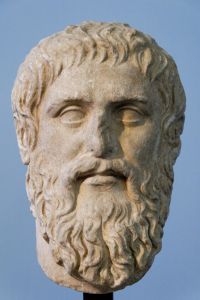
Plato – ( c. 427 BC – c. 347 BC)
Plato was an immensely influential classical Greek philosopher, student of Socrates, teacher of Aristotle, writer of philosophical dialogues, and founder of the Academy in Athens.
Plato (/ˈpleɪtoʊ/; Greek: Πλάτων Plátōn, pronounced [plá.tɔːn] in Classical Attic; 428/427 or 424/423 – 348/347 BC) was a philosopher in Classical Greece and the founder of the Academy in Athens, the first institution of higher learning in the Western world. He is widely considered the most pivotal figure in the development of philosophy, especially the Western tradition. Unlike nearly all of his philosophical contemporaries, Plato’s entire œuvre is believed to have survived intact for over 2,400 years.
Along with his teacher, Socrates, and his most famous student, Aristotle, Plato laid the very foundations of Western philosophy and science. Alfred North Whitehead once noted: “the safest general characterization of the European philosophical tradition is that it consists of a series of footnotes to Plato.”
In addition to being a foundational figure for Western science, philosophy, and mathematics,
Plato has also often been cited as one of the founders of Western religion and spirituality.
Friedrich Nietzsche, amongst other scholars, called Christianity, “Platonism for the people.”
Plato’s influence on Christian thought is often thought to be mediated by his major influence on Saint Augustine of Hippo, one of the most important philosophers and theologians in the history of Christianity.
Plato was the innovator of the written dialogue and dialectic forms in philosophy, which originate with him. Plato appears to have been the founder of Western political philosophy, with his Republic, and Laws among other dialogues, providing some of the earliest extant treatments of political questions from a philosophical perspective.
Plato’s own most decisive philosophical influences are usually thought to have been Socrates, Parmenides, Heraclitus and Pythagoras, although few of his predecessors’ works remain extant and much of what we know about these figures today derives from Plato himself.
The Stanford Encyclopedia of Philosophy describes Plato as “…one of the most dazzling writers in the Western literary tradition and one of the most penetrating, wide-ranging, and influential authors in the history of philosophy. … He was not the first thinker or writer to whom the word “philosopher” should be applied. But he was so self-conscious about how philosophy should be conceived, and what its scope and ambitions properly are, and he so transformed the intellectual currents with which he grappled, that the subject of philosophy, as it is often conceived—a rigorous and systematic examination of ethical, political, metaphysical, and epistemological issues, armed with a distinctive method—can be called his invention. Few other authors in the history of Western philosophy approximate him in depth and range: perhaps only Aristotle (who studied with him), Aquinas and Kant would be generally agreed to be of the same rank.”
Plato – [Wikipedia ➜ Plato – ]
Quotes by Plato :
The inexperienced in wisdom and virtue, ever occupied with feasting and such, are carried downward, and there, as is fitting, they wander their whole life long, neither ever looking upward to the truth above them nor rising toward it, nor tasting pure and lasting pleasures. Like cattle, always looking downward with their heads bent toward the ground and the banquet tables, they feed, fatten, and fornicate. In order to increase their possessions they kick and butt with horns and hoofs of steel and kill each other, insatiable as they are. – Plato –
★
Neither family, nor privilege, nor wealth, nor anything but Love can light that beacon which a man must steer by when he sets out to live the better life.– Plato –
★
We can easily forgive a child who is afraid of the dark; the real tragedy of life is when men are afraid of the light.– Plato –
★
Beholding beauty with the eye of the mind, he will be enabled to bring forth, not images of beauty, but realities (for he has hold not of an image but of a reality), and bringing forth and nourishing true virtue to become the friend of God and be immortal, if mortal man may. – Plato –
★
“All the gold which is under or upon the earth is not enough to give in exchange for virtue.” — Plato
★
